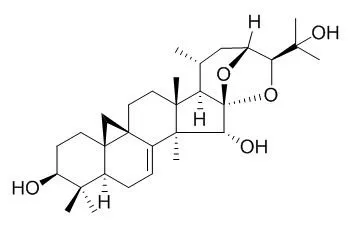| In vitro: |
| Food Chem Toxicol. 2011 Jan;49(1):166-72. | | 7,8-didehydrocimigenol from Cimicifugae rhizoma inhibits TNF-α-induced VCAM-1 but not ICAM-1expression through upregulation of PPAR-γ in human endothelial cells.[Pubmed: 20946932] | Activators of PPAR have been demonstrated to inhibit the induction of VCAM-1 but not ICAM-1 in human endothelial cells (EC). During the screening of anti-inflammatory activity of traditional herbs, we found 7,8-Didehydrocimigenol (7,8-DHC), one of active triterpenoids of Cimicifugae rhizoma (C. rhizoma) increases PPAR-γ expression in EC in a time- and dose-dependent manner.
METHODS AND RESULTS:
Therefore, we asked whether 7,8-Didehydrocimigenol selectively inhibits the expression of VCAM-1 but not ICAM-1 in TNF-α-activated EC via upregulation of PPAR-γ. Treatment with 7,8-Didehydrocimigenol or PPAR-γ agonists (GW1929, troglitazone) inhibited the expression of VCAM-1 but not ICAM-1. 7,8-Didehydrocimigenol significantly inhibited NF-kB activity via inhibition of phosphorylation of IkB and it also inhibited phosphorylation of ERK1/2 and Akt but not PKC. Finally, attachment of monocytes (U937) to EC by TNF-α was significantly reduced by 7,8-Didehydrocimigenol .
CONCLUSIONS:
These results indicate that upregualtion of PPAR-γ by 7,8-Didehydrocimigenol in EC inhibits NF-kB activity of TNF-α-activated EC which leads to selective inhibition of VCAM-1 expression. In addition, ERK1/2 and Akt signal pathways are involved in differential regulation by 7,8-Didehydrocimigenol. We concluded that 7,8-Didehydrocimigenol can be used for the treatment of cardiovascular disorders such as atherosclerosis. |
|






 Cell. 2018 Jan 11;172(1-2):249-261.e12. doi: 10.1016/j.cell.2017.12.019.IF=36.216(2019)
Cell. 2018 Jan 11;172(1-2):249-261.e12. doi: 10.1016/j.cell.2017.12.019.IF=36.216(2019) Cell Metab. 2020 Mar 3;31(3):534-548.e5. doi: 10.1016/j.cmet.2020.01.002.IF=22.415(2019)
Cell Metab. 2020 Mar 3;31(3):534-548.e5. doi: 10.1016/j.cmet.2020.01.002.IF=22.415(2019) Mol Cell. 2017 Nov 16;68(4):673-685.e6. doi: 10.1016/j.molcel.2017.10.022.IF=14.548(2019)
Mol Cell. 2017 Nov 16;68(4):673-685.e6. doi: 10.1016/j.molcel.2017.10.022.IF=14.548(2019)